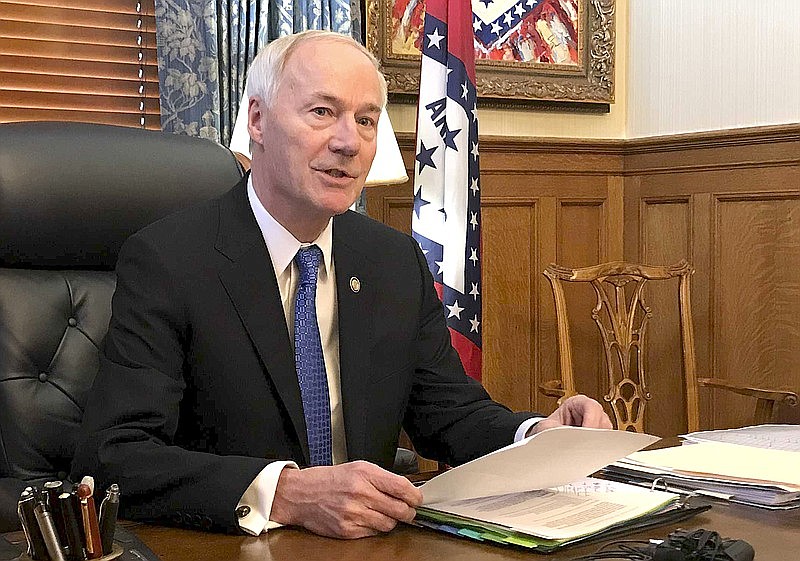The House voted Monday to curb the governor's emergency powers, sending legislation to Gov. Asa Hutchinson that would require lawmakers to review executive orders and would make it easier for them to end a state of emergency.
The legislation, Senate Bill 379, was pitched to lawmakers as a compromise after months of public frustration aired by some Republicans over Hutchinson's response to the covid-19 pandemic, including a mask mandate.
"Both sides are not 100% happy, so they came to an agreement," said Rep. Jack Ladyman, R-Jonesboro.
As the bill sailed through the Senate earlier this month, Hutchinson promised to sign it if it was passed by the House.
While the governor was open about his collaboration with the sponsors of SB379, he was more coy about his support, quipping to reporters last month, "If I say I support it, then it might make them want to be tougher, and so I need to be careful as to how enthusiastic I am about that."
Lawmakers already have the power to end an emergency declaration via a resolution, though there is disagreement as to whether that power exists outside of legislative sessions. Only the governor has the ability to call the Legislature into a special session.
Under SB379, the leadership or a majority of members in each chamber could agree to convene to consider ending a governor's emergency declaration.
The legislation would also give lawmakers the authority to block executive orders issued by the governor during an emergency and to deny the extension of an emergency declaration beyond 60 days.
The latter powers would be delegated to the Legislative Council, a body of lawmakers that meets to conduct business when the full Legislature is not in session.
The House voted 78-16 to pass SB379, with Democrats largely voting against the measure.
"This was an unprecedented situation and the governor had to make many tough decisions, and so I want to be clear that this is not a criticism for how the governor handled it," said state Rep. Jimmy Gazaway, R-Paragould, the House sponsor of SB379. "But what it is an effort to do is to restore an appropriate balance of power between the executive branch and the legislative branch."
In a separate but related action Monday, the Legislature voted to reverse the actions of the Hutchinson administration in fining businesses that violated public health orders.
The House voted 67-20 to refund thousands of dollars in fines levied against businesses for violating covid-19 protocols.
The legislation, Senate Bill 301, "does not have the support of the governor," according to its House sponsor, state Rep. Justin Gonzales, R-Okolona.
The state's Alcoholic Beverage Control Division alone collected $45,750 in fines as of March 1, according to a spokesman. The Department of Health said it collected $1,250 in fines from restaurants and other businesses.
A complete tabulation of the amount of business fines levied during the pandemic was not available from the state Monday.
State Rep. Brandt Smith, R-Jonesboro, said, "There were some moments where there were some overzealous inspectors around the state." Other lawmakers complained that most of the fines were on small businesses and not big-box stores.
Opposition to the bill again came mostly from Democrats, with four Republicans voting "no."
"It's setting bad precedent," said state Rep. Andrew Collins, D-Little Rock. "If we don't stick to what we do administratively, if we undermine ourselves in things like this, I don't know how we're going to get people to comply with fines that are justifiable down the road."
An assessment on the bill conducted by the Department of Finance and Administration noted that fines collected by Alcoholic Beverage Control are deposited into the state's general revenue and that "it is unclear whether it is within ABC's authority to refund the fines as set out in the bill."
To get a refund, the assessment said, businesses will have to submit claims with the Arkansas Claims Commission, a quasijudicial body based in Little Rock.
Both the Senate and the House voted in favor of SB301, though the Senate did not approve a clause allowing the bill to go into effect immediately.
Hutchinson's office said he will review the bill and decide "in the coming days" whether he will veto or allow it to become law.
Information for this article was contributed by Michael R. Wickline and Rachel Herzog of the Arkansas Democrat-Gazette.
